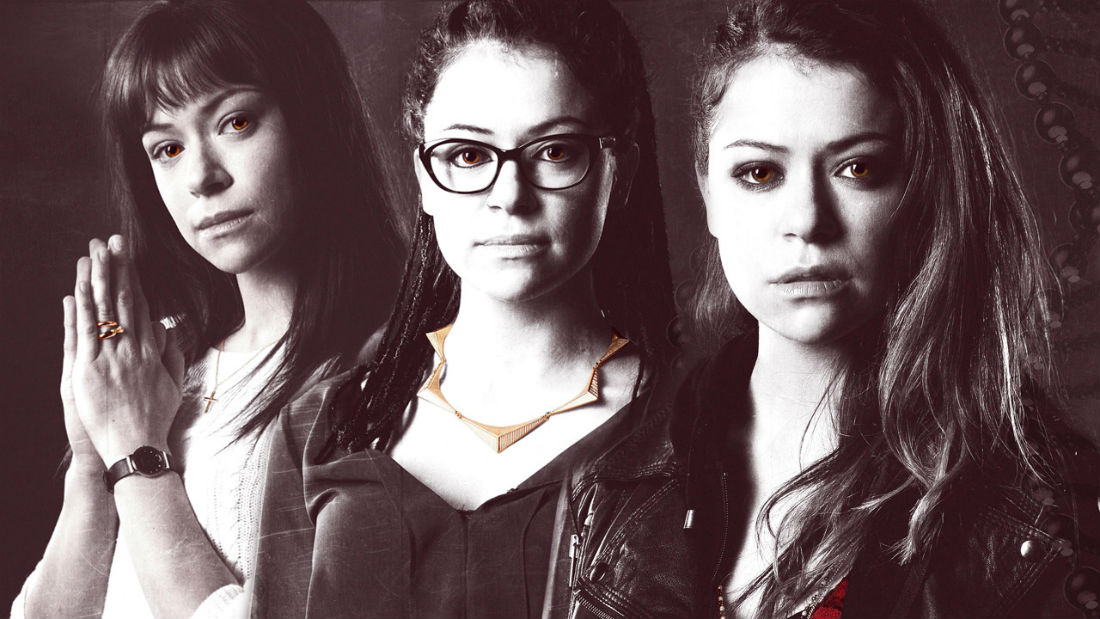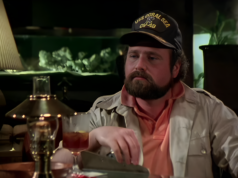Warning: Mild Season 2 spoilers ahead.
TV fans were all abuzz last week about Game of Thrones returning for its fifth season, and while I’m a big fan of HBO’s swords-and-sorcery show myself, I’m even more psyched for the return of Orphan Black tomorrow night. I’m all caught up on the Canadian science-fiction domestic comedy spy thriller police procedural, and I find it to be one of the most entertaining shows on the tube.
If you don’t know the show, Tatiana Maslany plays (among many other things) a British grifter named Sarah who returns to North America to reclaim custody of her young daughter when she discovers that she’s actually one of an unknown number of genetic clones scattered all over the world. Sarah has to band together with the other clones to solve the question of their existence: Alison, a tightly wound, gun-toting suburban housewife; Cosima, a gay stoner who’s a genius-level biology grad student; and Helena, a Ukrainian homicidal psychopath who has become an unlikely ally.
The program’s calling card is Maslany, who to date has played eight different women and one transgender man on the show. The petite native of Regina, Sask., (who can also currently be seen as Helen Mirren’s younger self in Woman in Gold) so completely disappears into her characters that even though many scenes feature more than one clone in the shot, you frequently lose sight of the fact that the same actress is playing all the characters. Granted, the show’s costume, hair, and makeup people deserve a lot of credit, too, but Maslany’s absorption of these characters is so complete that even when one clone impersonates another one, you can detect the difference. A trained dancer, she gives each of the characters distinctive ways of walking and uses different voices. (Helena’s low, languorous delivery contrasts well with Alison’s high-pitched, quick-moving speech.) If you’re wondering how much emotional depth she brings to these roles, look no further than the climax of the fourth episode of Season 2 (“Governed As It Were by Chance”), where her performance makes for the greatest “It can’t be you! I killed you!” scene in TV history.
The program shifts wildly in tone and genre, with Alison seeming to inhabit a Desperate Housewives-like satirical soap opera, while Sarah spends much of the first season impersonating a dead clone who was a homicide detective, so that portion of the show plays out more like a cop drama. Other people have noted that any of the main clones could headline their own show. (I’m not so sure; I think if there was greater focus on Alison or Cosima, we’d spend a lot of time wondering what ass-kicking hot mess Sarah was up to.) Lili Loofbourow’s featured article on the show in the New York Times floats the brilliant notion that the show’s mix of genres is a commentary on TV itself and how it tends to put female characters into neat little boxes. The way these worlds spill into each other throws old, established rules into gratifying chaos.
I see the show as more directly feminist. Series creators John Fawcett and Graeme Manson have created a conspiracy plot filled with shadowy forces and organizations who seek to control the clones, whether it’s the biotech corporation that made the clones or the religious faction that wants the clones dead or the splinter group that wants to use them to mother a new super-race. They all have one thing in common, whether they see the identical-looking women as scientific subjects or abominations before God or as child-bearing machines; they all see the clones as not human. This neatly reflects the sexism that the clones encounter in their daily lives, from the community theater director who gropes Alison during rehearsal to the 11-year-old boy who responds to Sarah’s request to borrow his phone with, “Can I touch your boob?” Comparing Orphan Black to the rest of the narrow field of feminist shows written by men, it hasn’t yet reached the dizzying heights of Joss Whedon’s Buffy the Vampire Slayer or Rob Thomas’ Veronica Mars, but it could very well get there.
Here’s what the show has in common with The Hunger Games, the Divergent series, and Joss Whedon’s similarly themed, short-lived show Dollhouse: They all show that their heroines can’t trust either the system or the revolution. The corporation that made the clones is evil for sure, but the anti-cloning forces are various combinations of Luddite and religious extremist. Sarah’s foster mother (Maria Doyle Kennedy) takes refuge with her amid her old underground network of hippie activists, only to learn that they’ve been compromised, too. The outside interests have infiltrated the clones’ bosses, co-workers, and domestic partners. No wonder the clones can only trust one another, and Felix (Jordan Gavaris), Sarah’s gay foster brother who’s more devoted to her than many biological brothers would be.
Don’t read all this and think the show has no sense of humor. Maslany is also very funny, and the clones sometimes swap places with diverting results. The seventh episode of Season 2 (“Knowledge of Causes, and Secret Motion of Things”) is excellent farce, with Sarah impersonating Alison at a rehab clinic while Alison tries to keep Sarah’s abusive ex-boyfriend from informing on them to the police, and it all ends with one of the series’ major villains being killed in an outrageously stupid, accidental (but not random) way. The show also deliberately uses cheesy songs to illustrate its scenes. Sometimes these are too on the nose, like Meredith Brooks’ “Bitch” being used as the background for two housewives fighting, but more often the songs are zesty touches on the action, like Anne Murray’s “Snowbird” and Conny Kampla’s German-language cover of “These Boots Are Made for Walkin’.” A single party sequence in the first season boasts “Wannabe,” “This Is How We Do It,” and “Lovefool” — somebody at that party must have had a ’90s compilation CD.
Everybody seems to have a favorite clone. I don’t really, but I’ll tell you which one fascinates me the most. It’s Rachel, the biotech company’s CEO who emerged as a formidable enemy for the clones in Season 2. Rachel puts up an imposing front as a dispassionate, calculating business mogul, but underneath that façade she’s highly unstable, roiled by abandonment issues and other violent emotions that she can’t control. (By the way, that move that Rachel’s foster dad pulled on her at the end of Season 2? That’s seriously cold.) She hates Sarah with a special passion because Sarah is everything that Rachel isn’t, among them fertile, ragged, and working-class. Rachel is rich, highly educated, and meticulously plans every move, while Sarah lives hand to mouth and never seems to have a plan. Yet despite all this, Sarah seems to keep coming out on top. I really think Rachel’s headed for some sort of implosion, and there’s no telling who she might take down with her.
Did you know Maslany also acted in David Cronenberg’s Eastern Promises? She provided the offscreen voice of the Russian prostitute who dies at the beginning of the film, and whose incriminating diary becomes a bone of contention with the characters.
I wondered whether the stage play that Alison acts in in Season 2 was created for the show. The lyrics seemed too specific to her predicament, but not many TV showrunners are versatile enough to pen a fake Broadway-style musical. Turns out that Blood Ties: The Musical is a real show by Anika Johnson and Barbara Johnston (who also moonlight as members of a Spice Girls tribute band) about four friends cleaning up after a suicide. “And we shall wipe, wipe, wipe away the plasma, / Scrub off every stain. / Since I cannot control my asthma, / I’ll stand by to entertain.” What I wouldn’t give to see that on stage.
The titles of the episodes are taken from historical sources. The first season’s chapters quoted Charles Darwin’s The Origin of the Species, while the second season took its titles from the various scientific writings of the 16th-century English naturalist Francis Bacon. So far, we have only one episode title for Season 3, “The Weight of This Combination,” which seems to be from President Dwight Eisenhower’s farewell address in 1961. Going from Darwin to Bacon to Eisenhower seems strange, but that farewell address warned the American public of the dangers of the military-industrial complex. That would seem to fit the theme of the upcoming season, where we learn more about the military origins of the project that created the clones. It turns out there’s a set of male clones, too. Delving into this poses a risk of taking the focus off the women here, but it makes sense that any military would be interested in creating an inexhaustible supply of reproducible, dispensable soldiers.
In addition, I hope we hear more from the transgender clone, Tony. His one-episode cameo in the second season was one of the show’s missteps, because it felt like a stunt to show the lead actress portraying a man. When Cosima fires off a comeback of, “My sexuality is not the most interesting thing about me,” she was strongly characterized enough at that point that we knew it was true. That’s not the case with Tony. We need more screen time for him to make him into a rounded character. I also hope we haven’t seen the last of Jesse (played by Patrick J. Adams from Suits), the truck driver who picks up Helena at a bar and makes her feel something like love for the first time in her life.
I’ll leave you with this video of Cynthia Galant, the actress who plays Rachel as a child, re-creating the clone dance party from the end of Season 2. Happy viewing, fellow Clone Clubbers!












